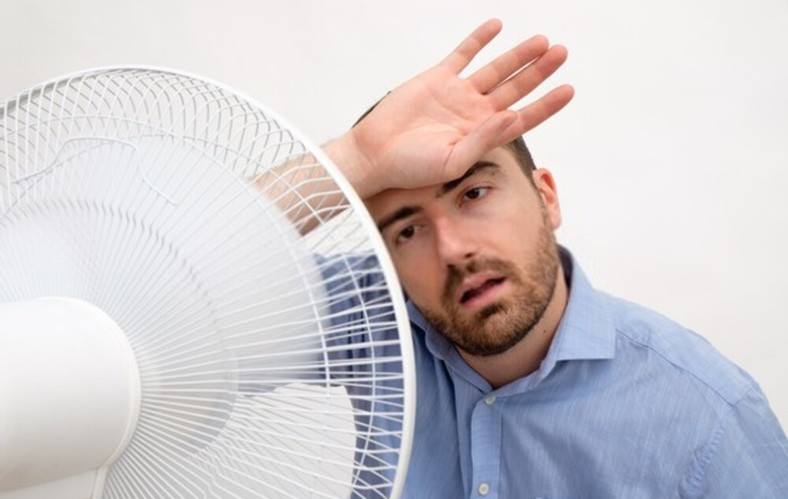The sweat glands in overweight people are often found in places other than the armpit. For example, being overweight can cause the sweat glands near your neck, face, and back to get bigger, so they are more spread out. Dr. Castiello said this is one way that overweight people could be more prone to perspiring than others. Not just fat people, but also people with muscular builds or those who are very muscular may sweat more than average, he said. Dr. Castiello came to this conclusion after scanning sections of the body of overweight and thin people.
He found that the sweat glands in overweight people were more widely spread out or more extensive. The same was true for muscular people. Castiello said this is a typical pattern when an organ in the body has to work harder than usual. He said he thinks a larger sweat gland in a heavier person may be trying to cool down their body faster, which is why overweight people seem to sweat more.
Why do Fat People Sweat more than Others?

As an obese person, there are more factors than just your weight that influence how much you sweat. For example, an obese person sweats more because of a high level of fatty deposits in the skin. In fact, the more fat you have, the more likely you are to sweat. An accumulation of fatty acids beneath the skin causes this. An excessive amount of fatty acids results in your body heat having a harder time releasing through sweat glands. Fatty acids allow heat to accumulate in the lower layers of your skin—petroleum jelly works in a similar fashion for this reason. They’ll go through all of the reasons why fat people sweat more than others in this post.
Physical Fitness

The rate at which you sweat is directly proportional to your degree of fitness. Slower metabolism, as a result of being inactive, is correlated to increased Sweating. “As a result of being sedentary, the metabolism will have slowed down, which leads to an increase in how fast you sweat.”– Dr. Ronit Donahue. The more fit you are, the more sweat glands you have. Sponge-like sweat glands have more surface area for better evaporation through your skin.
Fat molecules can get trapped in these pores, which results in an increased rate of Sweating. The more active you are, the more sweat there is on your body, which means more heat is being released through your skin. If you consider the reasons why overweight individuals sweat more, you’ll see that some of them are due to our bodies’ attempts to keep us cool. Fat molecules can get trapped in these pores, which results in an increased rate of Sweating. The more active you are, the more sweat there is on your body, which means more heat is being released through your skin. As a result, if your fitness level is low, you’ll have to work more to complete simple tasks like going upstairs.
If you have a sedentary lifestyle, your body is going to be working at a much slower rate. Your body will be working less to produce sweat than someone who’s more active. This means that your body will sweat less than other people. People who don’t exercise often and do not participate in any other physical activity will be sweating the least. If you’re constantly sitting around and not doing anything, your body will end up working slower than someone who’s constantly exercising. The faster you sweat and emit heat, the more active you are. The more fat there is accumulating on your skin, it’ll be harder to release excess heat through your skin—or any other means for that matter.
To improve your physical fitness and overall health, consider trying out some of the fitness centers around Fort Hood. These centers offer a variety of equipment and classes to help you get in shape, whether you’re a beginner or advanced fitness enthusiast. With the guidance of certified trainers and a supportive community, you can reach your fitness goals and feel your best.
Why Is It That Fat People Are Always Hot?

The recent U.S. heatwave has many people wondering why overweight people seem to be sweating more than others. It nearly makes sense from a purely physical standpoint, because fat tissue generates more heat due to its larger insulation between the skin and the body’s internals. And we all know that fat tissue produces more heat. However, not all fat tissue is created equal. Some areas of the body require much more insulation because the skin is constantly rubbing against something like bone, which produces friction and heat as a result.
Below is a shortlist of places where fat tissue is present in those who tend to be obese:
- Around the organs (like the heart and lungs).
- Between muscles and bones.
- Under the skin.
- Between the skin and the outer layer of fat tissue.
Fat in these areas insulates and protects the body’s internals from bumps, bruises, and friction with other parts of the body. All of these areas demand more fat tissue to protect them from damage. Furthermore, if your body composition is such that you need this much extra insulation (i.e., very high-fat mass), you’re also going to need more insulation around the organs. So instead of having a case of “multiple chins,” your body may have multiple layers of fat tissue under the skin. This is the reason for more noticeable sweat stains on fatter individuals, even in moderate temperatures. The extra layers of fat tissue are constantly trapping heat that would otherwise escape through sweat or radiation (heat emitted from the body).
In short, your body’s size affects how much you sweat since a larger body is typically hotter and harder to cool than a smaller one. The larger your body, the more blood vessels your skin is exposed to, which allows for your skin’s external layer of cells (epidermis) to sweat directly. A larger weight also means that you will be using more energy and therefore produce more sweat as a result.
Age

The glands are the kidneys, and sweat is your body’s natural mechanism for maintaining a constant core body temperature. In adults, the glandular secretions keep you from overheating. The decrease ineffectiveness of these glands decreases how well your body cools itself and causes it to produce more sweat. Another factor is that with age, we tend to breathe deeper, and we age, causing us to lose our ability to cool our body by breathing and becoming less efficient at cooling our body through sweat.
Diet

The foods that you eat can have an effect on how much you sweat. For example, salt in the diet is closely related to increased Sweating. In one study, cutting back on sodium chloride reduced sweat volume by as much as 50 percent. This occurs because salt increases the body’s need for water. When it can’t obtain water from food, it takes fluid from body tissue to dilute a high-salt diet. That can alter the amount of sweat produced by the sweat glands.
If you want to sweat less, avoid foods that trigger sweating like caffeine, spicy foods, red meat, and most processed food. A possible solution would be to increase your intake of water-rich foods, which can include dark leafy greens and fruits. These are good sources of antioxidants. It is also important to monitor what you are eating as well as how much salt is in the diet since that can also have an effect on Sweating.
If you’re looking to lose weight and reduce sweat production, check out these diet plans . Changing your diet can be an effective way to shed unwanted pounds, leading to reduced sweating as a result. Incorporating healthy, balanced meals and cutting out processed foods and sugar can make a significant difference.
Sweat Gland Distribution
Fat is deposited in the most superficial layer of the body, but most sweat glands are situated in the deeper layers. Sweat is released by these glands into ducts that empty into the underarm region. The sweat ducts are easily accessible, which makes us more vulnerable to infection, especially in people who are obese or have skin disorders. The skin on our bellies is also more sensitive to irritants because it’s not protected by an outer layer of fat. While most sweat glands have a diameter of about 1 millimeter, the sweat glands in our abdomen have a diameter of about 2 millimeters. These glands are under a lot of pressure to release a lot of sweat. The thicker the skin, the more it can absorb external stimuli. It is possible that many obese people have abnormally thick skin on their bellies because of too much fat and pressure from their weight. This would explain why they perspire so much on their bellies while other areas remain dry.
Another reason you appear to sweat more than others is the distribution of your two to four million sweat glands. The distribution of sweat glands is not distributed evenly throughout the body. They are mainly in your palms, soles of feet, underarms, and axillae. About 75% are located under the arms.
What Can You Do If You’re Sweating More Because You’re Overweight?
What can you do about the fact that you’re sweating like an obese person? There are very few sweat glands in the body, but the ones that are there will continue to work harder for your body. As an overweight person, your body temperature will be higher than that of other persons. The heat generated by your heavier weight alone can make it possible for you to sweat excessively. If you carry a lot of excess weight, the excess fat just adds to this problem because fat is made up of oils, and it can easily clog your pores.
Choose The Right Clothing

Because sweating is unavoidable, wearing the appropriate clothing might help you reduce the amount of perspiration you produce. Try wearing lighter clothes that allow for more air to circulate. Avoid wearing certain fabrics that will create too much friction on your skin. Another thing you can do is choose the right kind of fabrics to wear, like cotton or wool.
When it comes to sweating, wearing the right clothes can make a huge difference. Opt for loose-fitting, breathable fabrics such as cotton or linen to help stay cool, especially in hot and humid conditions. Check out our summer outfits for women article for more inspiration on lightweight and comfortable clothing options.
Wear Looser Clothes
Overweight people tend to wear clothes that are tight-fitting, and they end up sweating more because there is no room for them to breathe properly. Loose clothing is the best way for you to go since it allows your body heat, as well as sweat, to escape easily.
Diet

Good idea, right? But this really only works if you like the cooling sensation and if it doesn’t make you too uncomfortable. Some people might dislike such a diet as it is bland and rather uninteresting. Others find that they don’t even notice the difference in their sweating rate at all. However, if you’re going to try the diet, start out with small portions. You can always eat more as you feel you need to. If you’re not a fan of bland meals, adding a bit of soy sauce and/or salt might help make it taste better to you.
Others say that, in order to break out of the pattern of sweating too much, they need to exert themselves in different ways. This is not something you can do with just any activity either. Some activities are just too tedious or boring for you to want to do when you’re overweight. Examples of good choices include walking, jogging, playing basketball, volleyball, cycling, and using an elliptical machine.
Use More Effective Antiperspirants
Certain antiperspirants only slightly reduce sweating and don’t stay very long. For example, you can use something called Basoform. Bioform is one of the only products that actually controls excess Sweating by blocking your sweat ducts, causing less Sweating. This product is particularly effective for people with excessive or painful sweating problems.
Re-train Your Sweat Glands
Most people have sweat glands in their armpits, which are triggered by the actions of the sympathetic nervous system. By learning how to control your sympathetic nervous system reactions, you can then re-train your sweat glands into switching off when they shouldn’t be on. Learn to breathe deeply and slowly, having more intercostal (breathing) space between your ribs and lung area. By learning this technique, you can literally control how much you sweat, causing your glands to go off when needed and switching them off when they’re not.
Consider Botox Injections

Botox injections can help you sweat less and have less body odor. Botox Injections are most commonly used in the underarm, which is a region that is affected by excessive Sweating. Botox is a drug that comes from clostridium botulinum, and it is found in the area of the nerve called the axon. This area is responsible for sending signals to your sweat glands to increase your body temperature and causes you to sweat more than usual. This is a common condition called hyperhidrosis. Botox Injections help the nerve to function correctly, so it does not send the message too quickly and causes more Sweating. You can have Botox injections at a doctor’s office, though most people decide to have the injections done at home.
Botox Injections are often accompanied by other treatments for Excessive Sweating. Topical creams are often used to reduce excessive Sweating, though they may not be as effective as Botox injections. Antiperspirants also do not last as long as Botox Injections will, and they can leave stains on your clothing or cause health problems if you use them too much. Look into Botox Injections if you’re looking for a safe therapy for excessive sweating.
Sweating Explained
Sweat is primarily water, although it contains sodium, chloride, potassium, calcium, and magnesium as well. Each ingredient is essential for maintaining a healthy thermoregulatory system in your body. Sweating is the way your body regulates its internal temperature when it’s hot or cold outside. The sweating mechanism works when the hypothalamus, a region in your brain, senses that it’s either too hot or too cold and sends a message to the sweat glands. When this message is sent, it triggers an automatic response, and you begin to sweat. The sweat from your body cools you down or warms up your body, depending on the outside temperature.
In between hot and cold, you regularly sweat out a lot of salt. This is because Sweating is an important way of ridding the body of excess salt, which is necessary for water balance and bodily functions. A lot of your blood volume also comes from the process of Sweating. As you can see, Sweating has a number of roles in our bodies, and one of the most important tasks that it performs is to regulate our body temperature.
If you’re wondering why some people sweat more than others, it’s all down to their number of sweat glands. People who have more sweat glands than normal will sweat more frequently and profusely. There isn’t a lot that can be done to change this, but wearing breathable clothing and using antiperspirant can help to reduce sweating. Consider investing in moisture-wicking shoes like ones rated by OSHA to help keep your feet dry and prevent odor.
Sweating and Fitness

Sweating causes the average person to lose 1.5 to 2 liters of fluid during exercise in temperate weather. When you add excessive humidity and heat to the equation, your fluid loss rate might easily quadruple. So, what’s a person to do? Drink more water!
Most experts recommend that people drink two cups (16oz) every fifteen minutes for light exercise or four cups (32oz) every twenty minutes during moderate-to-strenuous exercise. This may sound like a lot, but remember it’s much easier for your body to absorb fluids when If you’re exercising or playing sports for more than one hour, You need to replace the fluid you lose through sweat when working out. Otherwise, you’ll dehydrate.
Why do fat people smell?
Certain foods contain ingredients that cause an odor when you sweat. These ingredients are choline and sulfur-containing foods. For example, eggs, garlic, fish, and other choline and sulfur-containing foods have a smell that comes through your sweat glands when you sweat. This is why fat people smell more than thin people do. The odor comes from smelly particles like sulfides, mercaptans, and methyl mercaptan.
You lose water and sodium chloride when you sweat. These are the major sweat-producing chemicals. Choline is a form of fat that has some similar properties to sodium chloride. It also contributes to odor when you sweat on choline-containing foods like eggs, fish, pork, beef, beans, and peanuts. Choline-rich foods are often high in sulfur-containing amino acids that cause excessive perspiration even without physical exertion.
FAQ
How do you combat too much sweat?
Increase your water intake.
If you’re struggling to keep your feet from sweating in work boots, check out these tips and tricks that can help you address the issue. From using moisture-wicking socks to wearing breathable boots, these hacks can make a big difference in reducing sweat and keeping your feet comfortable throughout the day.
Is there any type of exercise that triggers more sweat than others?
Bicycles produce the most sweat, but regular exercise is effective at removing toxins.
Why does the body produce more sweat when it’s fat?
The thicker the body, the more toxins it will need to remove.
Are fat people more prone to getting too much sweat?
Fat people tend to have lower water-to-body-weight ratios; this means that our bodies can’t stay hydrated as well as those with a higher ratio. This is why we’re prone to dehydration and heat exhaustion: we’re not taking care of ourselves as well as thinner people.
What exercise could be brought to help reduce excessive sweating?
To reduce excessive Sweating, try to increase your water intake.
Incorporating weight-burning exercises such as chest press, push-ups, and planks can help reduce excessive sweating. These exercises can help build muscles and in turn, increase your basal metabolic rate, which triggers your body to burn more calories even at rest. This can regulate your body temperature and reduce the amount of perspiration produced during exercise.
What should fat people do to combat high levels of sweat?
Water is critical to the body. Without it, you’ll be at higher risk for heat exhaustion and dehydration. It’s important not to over-hydrate. Instead, drinking enough of your body weight in ounces would be sufficient. For example, drinking 2 liters of water every hour would equal 5lbs of water loss per day or 10lbs/week or 23lbs/month.
Can I reduce my risk of developing obesity by exercising more?
Exercise is essential to healthy living. It helps our bodies detoxify themselves of toxins, so yes, exercise can help you reduce your body fat.
If you are looking to reduce the risk of obesity, it is recommended to increase the amount of physical activity. You can choose different types of exercises such as cycling or walking to burn more calories. Alternating between running and walking is also a great way to increase physical activity. Along with exercises, calculating your ideal weight can provide a better idea of maintaining a healthy weight.
What are some good exercises for fat people to do to lose weight?
Exercise any way you can. If the heat prevents you from exercising outside, spend time indoors on a treadmill or watching yoga/pilates videos on YouTube.
Out of 100 obese people, what percentage do you think suffer from hyperhidrosis (excessive Sweating)?
Among 33%
Is It Healthy To Sweat A Lot?
No. Sweating is actually a sign of low hydration, which can lead to dehydration. Dehydration causes your sweat glands to work harder, making you sweat more.
If you’re concerned about excessive sweating or hyperhidrosis, don’t worry; it’s not necessarily unhealthy. Find out more about how to deal with hyperhidrosis by visiting How to Stop Excessive Sweating.
How are fat people different from skinny people?
Skinny people have higher water-to-body-weight ratios than fat people do. It’s just natural that their bodies will use more water to remove toxins due to the lower levels of toxins being excreted through their systems compared to fat people.
Does Losing Weight Help Excessive Sweating?
No. Losing weight is not going to help excessive Sweating. It’s just going to make your body try to sweat more to compensate for the loss in moisture.
